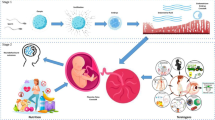Abstract
The development of biotechnologies has broadly interfered with a number of life processes, including human birth. An important moral question arises from the application of such medical technologies to birth: do biotechnological advancements violate human dignity? Many valid arguments have been raised. Yet bioethicists are still far from reaching a consensus on how best to protect the dignity of human birth. Confucianism is an influential ethical theory in China and presents a distinctive understanding of human dignity. In this paper, we reconstruct the two Confucian concepts of dignity—namely, universal dignity and personal dignity. We then apply these concepts to human birth in the context of biotechnologies involving embryos and genetic enhancement. We conclude that the dual Confucian understanding of dignity contributes a valuable perspective to the question of whether biotechnologies related to human birth violate human dignity.
Similar content being viewed by others
Notes
Unless otherwise indicated, all translations are the authors’ own.
Yao and Shun are saints, while Jie and Zhi are bad people.
Yao and Shun are sages in ancient China.
References
Li, Yaming, and Jianhui Li. 2017. Death with dignity from the Confucian perspective. Theoretical Medicine and Bioethics 38: 63–81.
Confucius. 2013. Liyun 礼运. In Liji [Book of rites]. Ed. Dai Sheng. Harbin: Northern Literature and Art Press.
Liezi. 2015. Tianrui 天瑞. In Liezi. Ed. Jing Zhong. Beijing: Chinese Publishing House.
Mencius. 2015. Jinxin xia 尽心下; Gaozi shang 告子上; Gongsunchou shang 公孙丑上; Gaozi xia 告子下; Gaozi shang 告子上; Gaozi shang 告子上; Gaozi shang 告子上; Gaozi xia 告子下. In Mencius. Ed. Wan Lihua and Lan Xu. Beijing: Chinese Publishing House.
Xun Zi. 2017. Wangzhi 王制; Xing’e 性恶; Ruxiao 儒效. In Xunzi. Ed. Fang Yong and Li Bo. Beijing: Chinese Publishing House.
Confucius. 2015. Yanghuo 阳货; Yanghuo 阳货; Yanghuo 阳货. In Analects. Ed. Zhang Yanying. Beijing: Chinese Publishing House.
Lo, Ping-cheung. 2010. Euthanasia and assisted suicide from Confucian moral perspectives. Dao 9: 53–77.
Sulmasy, Daniel P. 2008. Dignity and bioethics: History, theory, and selected applications. In Human dignity and bioethics: Essays commissioned by the President’s Council on Bioethics, ed. Edmund D. Pellegrino, 469–501. Washington, DC: President’s Council on Bioethics.
Raposo, Vera Lúcia, and Eduardo Osuna. 2007. Embryo dignity: The status and juridical protection of the in vitro embryo. Medicine and Law 26: 737–746.
Rorty, Richard. 1998. Truth and progress: Philosophical papers. Cambridge: Cambridge University Press.
Confucius. 2014. Kaizong mingyi zhang 开宗明义章. In The book of filial piety and the book of rites. Ed. Hu Shengping and Chen Meilan. Beijing: Chinese Publishing House.
Olberding, Amy. 2015. A sensible Confucian perspective on abortion. Dao 14: 235–253.
Ruiping, Fan. 2007. The ethics of human embryo stem cell research and the interests of the family. In The family, medical decision-making, and biotechnology: Critical reflections on Asian moral perspectives, ed. Shui Chuen Lee, 427–452. Cambridge: Harvard University Press.
Dworkin, Ronald. 2000. Playing God: Genes, clones and luck. In Sovereign virtue: The theory and practice of equality, 427–452. Cambridge: Harvard University Press.
Kass, Leon R. 2003. Ageless bodies, happy souls: Biotechnology and the pursuit of perfection. New Atlantis 1: 9–28.
Sandel, Michael J. 2007. The case against perfection: Ethics in the age of genetic engineering. Cambridge: Harvard University Press.
Düwell, Marcus. 2011. Human dignity and human rights. In Humiliation, degradation, dehumanization: Human dignity violated, ed. Paulus Kaufmann, Hannes Kuch, Christian Neuhäuser, and Elaine Webster, 215–230. Dordrecht: Springer.
Ruiping, Fan. 2010. A Confucian reflection on genetic enhancement. American Journal of Bioethics 10: 62–70.
Acknowledgements
We thank Katelyn MacDougald very much for her professional editing of this paper. Thanks also go to two anonymous reviewers for their helpful suggestions. We are indebted to the National Foundation of Social Science of China for funding support for this research. Our gratitude also goes to Marcus Düwell for inviting us to take part in the joint research project Human Dignity in the Context of Bioethics—China and the West. This China Exchange Programme is jointly organized by the Koninklijke Nederlandse Akademie van Wetenschappen (Royal Netherlands Academy of Arts and Sciences) and the Ministry of Education of China. Marcus Düwell and Jianhui Li are the leaders of the project on the Dutch and Chinese sides, respectively.
Author information
Authors and Affiliations
Corresponding author
Rights and permissions
About this article
Cite this article
Li, J., Li, Y. Birth with dignity from the Confucian perspective. Theor Med Bioeth 39, 375–388 (2018). https://doi.org/10.1007/s11017-018-9460-1
Published:
Issue Date:
DOI: https://doi.org/10.1007/s11017-018-9460-1




